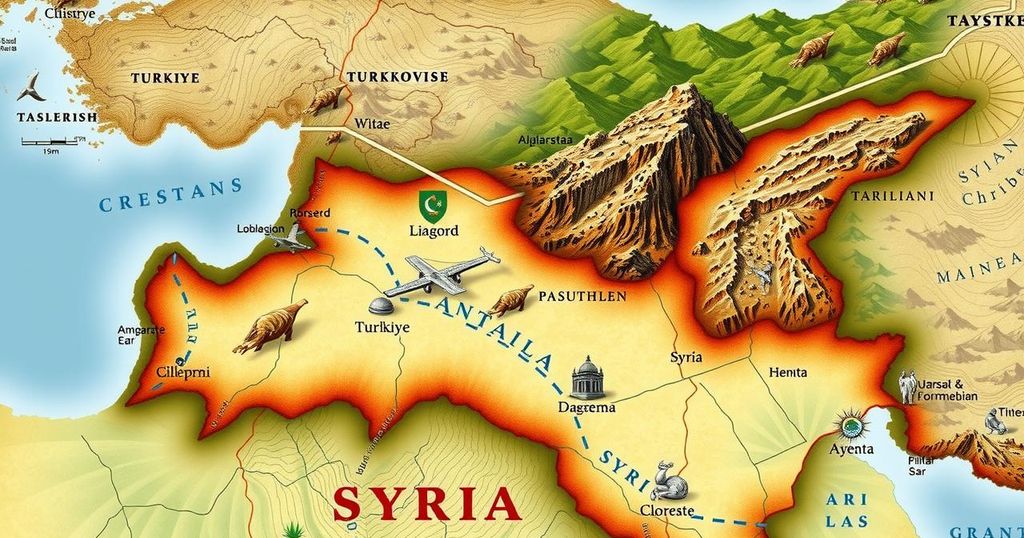Ocalan’s Call for PKK Disbandment: A Turning Point in Turkiye and Syria’s Power Dynamics

Abdullah Ocalan, founder of the PKK, has called for the disbandment of the group, signaling a shift in Turkiye and Syria’s power dynamics. His statement underscores a diminishing role for armed struggle and increases in Kurdish political participation. The agreement between the Kurdish-led Syrian Democratic Forces and the Syrian government exemplifies evolving alliances that could reshape security and political landscapes in the region.
The call by Abdullah Ocalan, founder of the Kurdistan Workers’ Party (PKK), for the group to disband is reshaping the power dynamics in both Turkiye and Syria. His statement reflects a key trend where the significance of armed conflict diminishes as Kurdish political participation rises. The implications of Ocalan’s call extend beyond Turkiye, facilitating a reconfiguration of relationships in the region, notably within Syria where an agreement between the Kurdish-led Syrian Democratic Forces (SDF) and the Syrian government exemplifies new alliances.
In February, Ocalan urged the PKK to gather for a congress and consider disbandment, asserting that all factions should lay down their arms. In response, PKK leadership in Iraq’s Qandil Mountains announced a unilateral ceasefire, postponing decisions on disbandment and disarmament until further discussions. Turkiye has remained staunch in its requirement that all PKK-affiliated groups, including their Syrian branches, must completely dissolve.
The protracted conflict between the PKK and Turkiye has claimed over 40,000 lives. Ocalan, who has historically led the group and its armed rebellion, is now pivoting to advocate for political engagement rather than violence, coinciding with shifts in Kurdish political movements and Turkey’s evolving security strategies.
Armed struggle’s diminishing influence has been overshadowed by the growing strength of Kurdish political parties. The People’s Democratic Party (HDP), recently renamed the Peoples’ Equality and Democratic Party (DEM), has significantly shifted the political landscape since surpassing a critical electoral threshold in 2015, gaining parliamentary representation that previously eluded them. This suggests a pivotal moment where Kurdish political mobilization becomes more viable than armed conflict.
Kurdish political leaders, including imprisoned HDP former leader Selahattin Demirtas, face government-imposed restrictions, which may begin to ease as pro-Kurdish political normalization takes root. The AK Party must balance addressing Kurdish demands with sustaining nationalist support as it engages with pro-Kurdish political dynamics, a move complicated by internal nationalist opposition that could hinder progress toward reconciliation.
The international ramifications of the Kurdish issue have historically impeded Turkiye’s foreign relations. Ankara’s approach to managing Kurdish normalization could enhance its regional and global standing, especially with Western allies prioritizing human rights and political representation in Turkiye.
While the PKK’s long-term dissolution remains uncertain, the political landscape is shifting. A recent agreement between the SDF and the Syrian government indicates potential for deeper cooperation, affecting both Turkiye’s policies and the future of Kurdish-controlled territories in northern Syria.
Turkiye’s military campaigns have dispersed the battlefield into northern Syria, reducing direct threats to Turkiye. However, the complexity of these conflicts continues as the PKK’s influence wanes. Political opposition within Turkiye, especially from the CHP, indicates skepticism toward a government-led resolution to the Kurdish question, complicating the political landscape ahead of future elections.
Ocalan’s call finds resonance amid a regional trend where armed groups must adapt to ensure their survival. The PYD, a PKK offshoot in Syria, could benefit from decreased Turkish hostility should the PKK disband, enabling them to maintain some level of governance in a future Syrian state.
The resolution of the Kurdish issue has potential to bolster Turkiye’s diplomatic position with Europe and the U.S. It may also foster better relations with Iraq and Syria by addressing historical grievances over military actions against Kurdish groups. Legislative reforms and a clear legal framework guiding the rights of PKK fighters and political actors are critical for a sustained peace process.
The fate of PKK fighters remains uncertain, with prospects including amnesty, political integration, or relocation. Sustaining the ceasefire and institutionalizing peace will require careful negotiation, understanding that it must accommodate competing interests and mutual concessions. The transition will not be straightforward and demands recognition of the complexities inherent in achieving lasting peace amid longstanding conflicts.
The call to disband the PKK by Abdullah Ocalan heralds a significant shift in the political landscape in Turkiye and Syria. This initiative reflects an evolving strategy where armed struggle is being superseded by political engagement. As Kurdish parties gain influence, the dynamics between Turkiye and their Kurdish population could be set to change considerably, potentially redefining regional relationships. A successful transition to peace will depend on creating inclusive political frameworks and addressing the underlying demands for Kurdish rights.
Original Source: www.aljazeera.com







